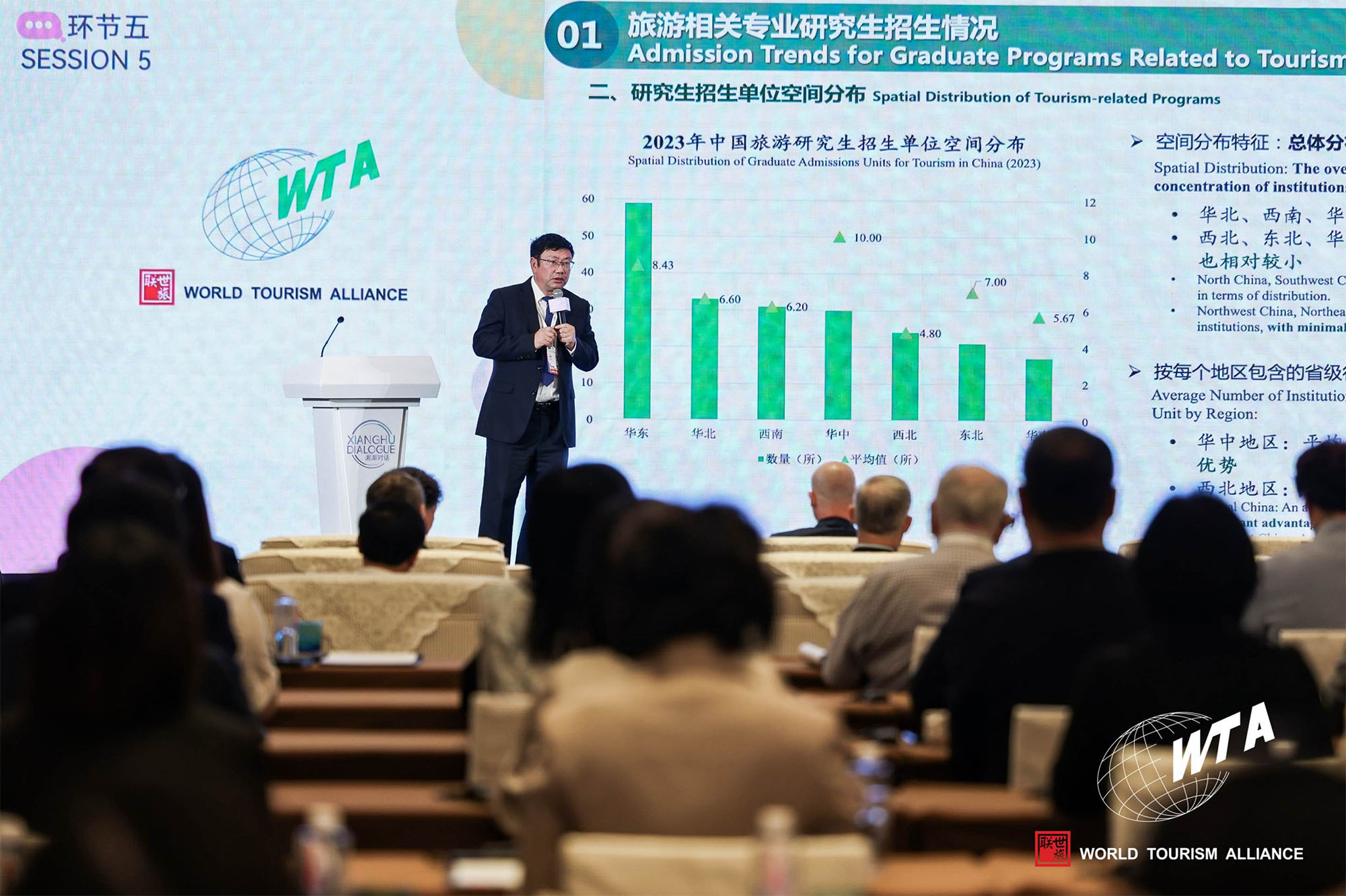2024-11-17
October 31, at the WTA· Xianghu Dialogue 2024 in Sanya, Hainan, Dr. BAO Jigang, Deputy Director, Faculty of Economics & Management of Sun Yat-sen University, Winner of the 16th Ulysses Prize Awarded by UN Tourism, delivered a keynote speech on "Reflections on Academic Graduate Student Education in Tourism Management in China". Below is a summary of the key points discussed.

As of April 2024, the total number of institutions offering tourism graduate programs had reached 215.As part of our in-depth analysis, we reviewed graduate enrollment trends in tourism-related programs across mainland China from 1990 to 2023. The number of institutions offering graduate programs in tourism has consistently increased over the years. By 2023, there were 157 institutions offering professional degrees in tourism, representing 73.02% of all institutions with graduate programs. This figure marks a 39.78% increase in institutions offering tourism management programs compared to 2021. By April 2024, the total number of institutions with tourism graduate programs had reached 215.
Regarding regional distribution, the number of institutions with graduate programs in tourism shows significant variation across different areas. East China has the highest number, with nearly 60 institutions providing graduate education in tourism, followed by North China, Southwest China, and Central China. Conversely, regions like Northwest, Northeast, and South China host fewer such institutions, though differences between these areas are relatively minor.
At the provincial level, the number of institutions offering graduate education in tourism is steadily increasing. All 31 provinces have at least two universities qualified to enroll tourism graduate students. Shanghai and Beijing each host 13 universities offering graduate programs, with other populous provinces like Henan and Shandong also playing a significant role. Between 2021 and 2023, 20 provinces experienced growth in tourism graduate programs, while nine others, including Shanghai, Yunnan, Heilongjiang, and Guangdong, maintained stable numbers.
Tourism graduate programs in China primarily focus on "Tourism Management". These programs aim to cultivate students’ understanding of tourism phenomena, develop and protect tourism resources, and balance supply and demand in the industry. This emphasis supports the high-quality development of the tourism sector. Tourism management education is primarily grounded in management and science (particularly geography), fostering a symbiotic relationship between academic study and industry practice. Given that tourism phenomena involve complex societal systems, interdisciplinary collaboration and dialogue are critical for generating innovative perspectives in research and practice. Such interactions encourage knowledge creation across multiple disciplines. Currently, tourism graduate programs span 14 academic categories, including philosophy, economics, education, history, management, arts, and interdisciplinary studies. This breadth highlights the inadequacy of categorizing tourism as a sub-discipline of business administration, given its expansive scope and evolving needs.
In 2023, 211 institutions offered master’s programs in tourism, an 8.76% increase from 2021. The master’s program in tourism covers 10 disciplinary fields, including management, science, law, economics, and interdisciplinary studies. Among these, the largest number of universities and institutions rely on management as their primary discipline, particularly in the field of business administration. This is followed by institutions that focus on natural science, with geography being the leading discipline in these cases. At the provincial level, the top five regions for the number of institutions offering master’s programs in tourism are Shanghai (13 institutions), Beijing (12), Henan (12), Shandong (10), and Hubei (9). Yunnan, with seven institutions, also ranks prominently, reflecting the province’s thriving tourism industry. This distribution aligns closely with regional economic development levels, the prosperity of local tourism sectors, and population demographics.
For doctoral programs, 49 institutions enrolled doctoral candidates in tourism-related fields in 2023, representing a 25.76% decrease compared to 2021. This decline is likely due to national policies aimed at controlling the total number of doctoral admissions. Tourism doctoral programs cover seven academic categories, including management, natural sciences, law, economics, philosophy, education, and engineering. Regionally, Beijing leads with eight institutions offering tourism doctoral programs, followed by Jiangsu and Yunnan, each with four institutions. Other provinces, including Fujian, Guangdong, Guangxi, and Shanghai, have three institutions each. Additionally, provinces such as Guizhou, Liaoning, Shandong, Shaanxi, Sichuan, and Zhejiang host two institutions each. Single institutions are found in provinces such as Hainan, Henan, Hubei, Hunan, Jiangxi, Qinghai, Shanxi, Tianjin, and Chongqing. Despite growing demand for Ph.D.qualified faculty in universities, the number of doctoral admissions continues to fall short of meeting this need.
Internationalization remains a critical benchmark for evaluating higher education quality and an essential trend in global academia. Many Chinese universities have established partnerships with overseas institutions to jointly develop educational frameworks, including dual-degree programs at both the master’s and doctoral levels. Leading institutions such as Sun Yat-sen University, Nankai University, South China Normal University, Hainan University, and Fudan University play a pivotal role in these collaborations. By 2023, there were 3 collaborative institutions and 5 joint programs offering graduate education in tourism, reflecting China’s commitment to fostering global academic exchanges.

As the scale of graduate admissions in tourism management continues to grow, a multi-tiered talent supply system is expected to emerge to support the high-quality development of the tourism industry in China. Under the ‘New Liberal Arts’ initiative, tourism graduate education should focus on cultivating application-oriented, interdisciplinary, and innovative talents. I see two key directions for structural adjustments in tourism graduate education: 1. Tourism Doctoral Degrees: In the context of expanding master’s programs, universities should promptly apply for doctoral programs in tourism professional degrees, drawing inspiration from fields like accounting and auditing. This will better integrate tourism research and industry practice. 2. Leveraging Alumni Networks: Professional degree graduates represent a valuable resource for fostering cooperation between universities and businesses. Establishing platforms for knowledge exchange and practical application will bridge academia and industry for integrated collaboration.